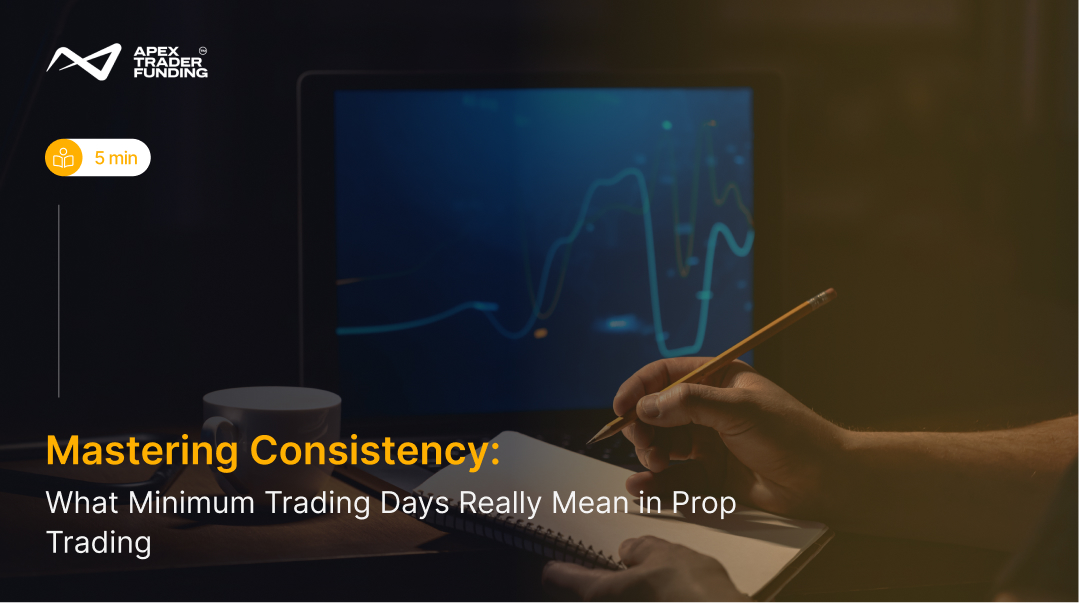
trading-inspiration | 30-10-25
In proprietary trading, consistency is everything. Prop firms design their evaluation rules not just to test profitability but to measure control, patience, and repeatable discipline. Among these rules, the “minimum trading days” requirement stands out as one of the simplest yet most misunderstood.
It’s not a hurdle meant to slow traders down — it’s a rule built to prove that your results come from skill, not chance.
What Is Minimum Trading Days in a Prop Firm?
The minimum trading days rule is a time-based requirement that determines how many separate trading days a participant must trade to complete an evaluation or challenge. In simple terms, you can’t pass the challenge in one or two lucky sessions — you need to show consistent performance across multiple days.
For example, a prop firm may require you to place at least one trade on five different trading days before your account is considered for funding. Each of those days counts separately, and skipping a day doesn’t reset your progress.
This rule helps firms confirm that traders can perform under different market conditions and that their strategies are not purely situational or emotion-driven.
Why Minimum Trading Days Matter?
The intent behind the rule goes far beyond formality. It ensures that profitability is a result of strategy and structure, not short-term luck.
Key purposes include:
- Consistency Verification: Firms want traders who can maintain steady performance across several sessions, not those relying on single high-risk trades.
- Risk Management: The rule encourages traders to size positions carefully and avoid large drawdowns.
- Emotional Stability: Trading on multiple days tests a trader’s ability to stay calm and follow rules even after wins or losses.
- Long-Term Mindset: It prevents impulsive behavior by making traders think like professionals managing sustained portfolios rather than chasing quick profits.
Consistency isn’t built in a single trade — it’s forged across days when discipline matters more than results.
Typical Requirements Across Firms
Different firms apply the minimum trading day rule differently. Some have strict guidelines, while others give traders full flexibility.
The minimum trading days rule remains an essential tool for firms to identify structured, consistent traders who can manage emotions across multiple sessions.
While some modern firms have introduced no minimum day challenges to give traders more flexibility, this approach simply caters to different trading styles — it doesn’t replace the value of consistent daily practice.
For many traders, the discipline developed through meeting a minimum trading day requirement builds habits that directly translate to long-term success in funded accounts.
How Minimum Days Are Counted?
Each “trading day” is defined by activity. Generally, placing at least one executed trade on a given day qualifies it as a trading day. However, the details may vary:
- Some firms require that the trade be opened and closed on the same day.
- A few may set minimum profit or activity thresholds for a day to count.
- Most count partial trading days (even a single trade) toward your total, provided the trade meets rule conditions.
Understanding these fine details is critical. Missing a day or misunderstanding a firm’s definition could delay your progress or even cause disqualification during evaluation.
The Role of Consistency Rules
The minimum trading days rule often works hand-in-hand with the consistency rule — another important guideline for evaluation success.
For example:
- A firm may require that no single day’s profit exceeds 40% of your total target.
- This ensures that your success is distributed evenly and not driven by one extraordinary day.
Both rules aim to prove one thing — that you can manage yourself as effectively as you manage trades.
Minimum Days in Funded Accounts
It’s worth noting that the minimum trading day requirement usually applies only during the evaluation or prop firm challenge phase. Once traders receive a funded account, most firms remove this restriction.
At that stage, you’re trusted to trade responsibly — managing risk, following rules, and producing consistent results on your own timeline.
This reflects the real-world trading environment, where results matter more than daily activity.
“Minimum trading days don’t limit opportunity; they teach the rhythm of professionalism — showing that real traders earn success one session at a time.”
Final Thoughts
TThe minimum trading days rule is less about limitation and more about proving consistency under structure—especially when using copy trading strategies that need multiple days to demonstrate reliable performance. Whether you trade daily or selectively, understanding and respecting this rule builds the habits that funded traders rely on for longevity.
Looking to prove your consistency and earn a funded account?
Start your trading journey today with Apex Trader Funding — explore flexible evaluations like the 25K Rithmic Account or 25K WealthCharts Account and take your next step toward professional funding.
FAQs
Minimum trading days are a requirement set by most prop firms to ensure traders demonstrate consistency over time rather than relying on a single lucky trade. To meet this rule, a trader must place at least one trade on a set number of separate days during the evaluation phase.
Each firm defines a “trading day” differently — for some, any day with one executed trade counts, while others may require a trade to be opened and closed on the same day. The goal is to prove that a trader’s performance results from skill, discipline, and repeatable strategy, not chance. Meeting this rule shows the firm that you can perform steadily under varying market conditions.
Yes, most prop firms can detect copy trading through advanced monitoring tools and trading data analytics. They track trade timing, order size patterns, IP addresses, and platform identifiers to identify when multiple accounts place identical trades within seconds of each other. Copy trading violates firm rules because it undermines fairness and independent evaluation. Even subtle duplication across accounts can trigger review or disqualification, so traders should always use their own analysis and maintain unique trading behavior.
Related Blogs

trading-inspiration | 24-08-25
Are Funded Trading Accounts Legit or a Scam?
In the last decade, a new question has captured the curiosity of traders worldwide: Can you really trade with someone else’s...
Read more
trading-inspiration | 29-08-25
Do You Have to Pay Back Funded Trading Accounts?
You are never personally liable for trading losses in a funded account because you are technically an independent contractor trading...
Read more
trading-inspiration | 05-09-25
What Happens if You Lose Money on a Funded Account?
Every trader dreams of gaining access to more capital. Funded accounts make this possible, offering a chance to trade larger...
Read more